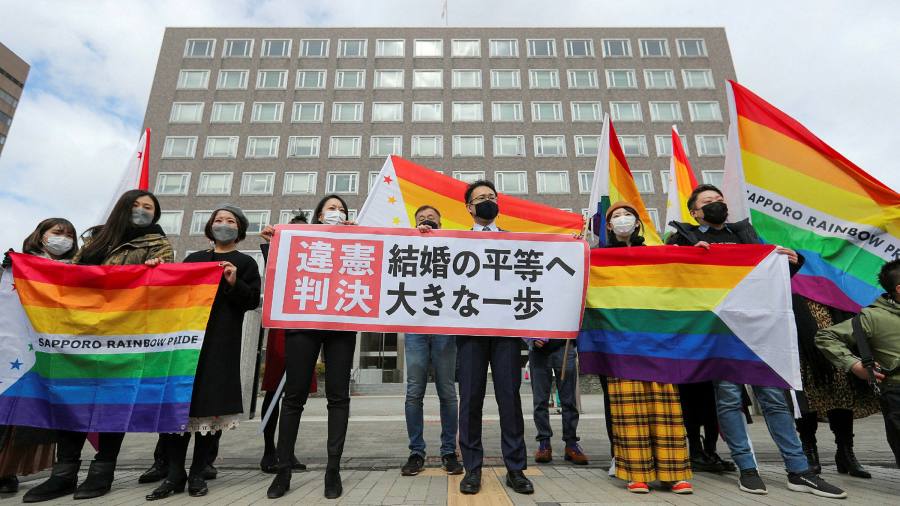[ad_1]
Japan’s refusal to marry same-sex couples is unconstitutional, according to a landmark court ruling that will stoke the country’s debate about gay rights.
In a case brought against the government by three same-sex couples, the Sapporo district court ruled that preventing them from marrying violated Article 14 of the country’s constitution, which outlaws discrimination on grounds of race, creed, sex, social status or family origin.
It was the first time a Japanese court has ruled for same-sex marriage on constitutional grounds, and came alongside a rapid shift in social attitudes towards homosexuality in Asia’s richest democracy.
Although the ruling did not immediately create the right for gay people to marry, it will put pressure on the government to change the law, boosting a movement that has led to local authorities across Japan issuing symbolic partnership certificates to same-sex couples.
“When I read what the judge said about how [the marriage system] is discriminatory I just couldn’t stop crying,†said Ryosuke Kunimi, one of the plaintiffs in the case.
“For a man like me in his mid-forties, who’s been living with his same-sex partner for 20 years . . . to have a judge say so clearly that the only difference between opposite and same-sex couples is sexual orientation, that’s really wonderful.â€
The case in the northern city of Sapporo was one of five brought across the country by campaigners for same-sex marriage. Judgements in Tokyo, Osaka, Nagoya and Fukuoka are expected in the coming months. But lawyers believed that at least one of those judgments will find the current law on gay marriage is constitutional.
The Sapporo court ruled that the ban on same-sex marriage did not violate Article 13 of the constitution, which guarantees the right to life, liberty and the pursuit of happiness, or Article 24, which requires mutual consent and the equal treatment of both partners in a marriage.
The court refused the plaintiffs’ demands for compensation and awarded costs against them. However, the decision to reject a monetary award means that the government cannot appeal and the ruling is final.
“The difference between heterosexual and homosexual people is simply a matter of sexual orientation, which a person cannot change, and whatever somebody’s sexual orientation, there can be no disparity in their rights under the law,†wrote presiding judge Tomoko Takebe in her decision.
With the ruling in hand, campaigners plan to switch their focus to national politics. “The court decision puts pressure on the Diet to start discussions about whether they need to change the law,†said Masa Yanagisawa, a Goldman Sachs banker who sits on the board of Marriage for All Japan, an umbrella group behind the effort.
Public support for same-sex marriage in Japan has increased rapidly in recent years, mirroring changes in Europe and the US. A recent survey found that two-thirds of the Japanese public are in favour, with the percentage rising to four-fifths in younger age groups.
Since the Tokyo ward of Shibuya began issuing partnership certificates to same-sex couples six years ago, the movement has spread to around one-third of municipalities across Japan, including some relatively conservative rural areas.
“Finally, this issue is on the national political stage,†said Yanagisawa, who argued the ruling would push employers to improve policies on discrimination against gay people. “I think things are changing in Japan.â€
[ad_2]
Source link






